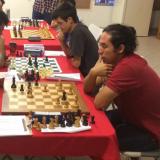Poetry & Chess
Chess and poetry are intertwined at the apex of human creations, soaring graciously above a myriad lesser brethren.
Such superlative displays of refinement might shed some light upon an otherwise havoc-fettered creature, hitherto lacking redemption from its own dim condition.
Saviors of their progenitor or not, chess and poetry answer to the human urges of representation and of being aesthetically pleased.
They hold wisdom in as much they use symbols that portray our timeless pathos, our everlasting bliss (to conquer an enemy king, to conquer a lovable queen).
Both appeal to abstraction to convey their beauty, and whether it is by words or by pieces over a board, beauty is conveyed -Duchamp dixit.
Both seize with a godlike grip.
Sublimation and delight notwithstanding, chess is a brutal endeavour, and if it weren't for its remanent violence it might not be that enchanting.
I ought to overstate the obvious, lest my partiality towards pacifism lead me astray.
But what option does one have when beauty meets bloodless violence, when the complexity of abstraction and the pleasure it provides is merged with the raw feeling of confrontation?
There is no possible resistance, you succumb to such beckoning.
Thus, we are lured into that maze of checkered squares, and mesmerized by its chaotic order, we re-enact some primeval rite over the board again and again, and again; unable to recognize the trance we are in but at the same time unwilling to withdraw ourselves from it.
Your instincts eclipse reality once the plot begins, and you are submerged into that false silence.
That silence where smoldered threats reign supreme, where the static nature of the body betrays an inner world of commotion, where the movement of a wooden figurine veils a stab to your opponents mind.
The most exquisite intensity is motionless.
Possessed by a thirst of glory and a need for beauty, you wade through a stream of splinters, whilom soldiers under your command and enemies under your damnation.
There is no remorse, no sin in the deaths of your subjects. For there is a greater purpose to their lives and it is to make you hold, as an arcane treasure, the bloody crown of another king.
Rest assure they will be reborn, this rite is endless and bound to our nature. Your satiated bliss will deplete (victim of its own hubris), and you will be driven to the battlefield yet again, like a lost soul in need of nourishment, knowing nothing but the yoke of time.
The chessboard is the circle of history.
And so, move by move, square by square you shall forge again the threads that will gently smother your enemy's hopes; or better still, you will command your pieces as a battering ram to smite with majestic might!
What an end in itself!
Utter exultation in the halls of your mind!
A warmonger dwells within ourselves, seemingly tamed, but coy.
Caissa grins at every king's demise
David P. G.



